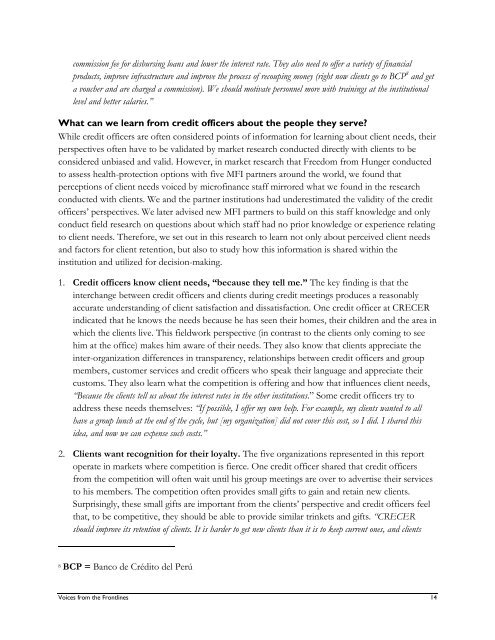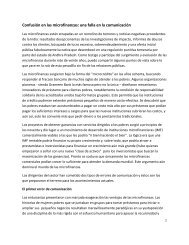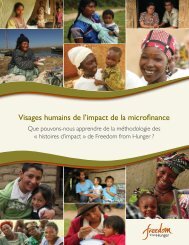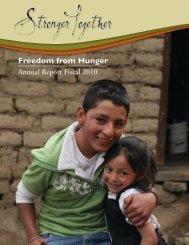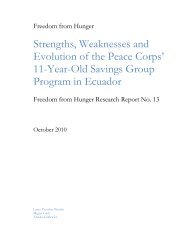Voices from the Frontlines: - Freedom from Hunger
Voices from the Frontlines: - Freedom from Hunger
Voices from the Frontlines: - Freedom from Hunger
You also want an ePaper? Increase the reach of your titles
YUMPU automatically turns print PDFs into web optimized ePapers that Google loves.
commission fee for disbursing loans and lower <strong>the</strong> interest rate. They also need to offer a variety of financial<br />
products, improve infrastructure and improve <strong>the</strong> process of recouping money (right now clients go to BCP 8 and get<br />
a voucher and are charged a commission). We should motivate personnel more with trainings at <strong>the</strong> institutional<br />
level and better salaries.”<br />
What can we learn <strong>from</strong> credit officers about <strong>the</strong> people <strong>the</strong>y serve?<br />
While credit officers are often considered points of information for learning about client needs, <strong>the</strong>ir<br />
perspectives often have to be validated by market research conducted directly with clients to be<br />
considered unbiased and valid. However, in market research that <strong>Freedom</strong> <strong>from</strong> <strong>Hunger</strong> conducted<br />
to assess health-protection options with five MFI partners around <strong>the</strong> world, we found that<br />
perceptions of client needs voiced by microfinance staff mirrored what we found in <strong>the</strong> research<br />
conducted with clients. We and <strong>the</strong> partner institutions had underestimated <strong>the</strong> validity of <strong>the</strong> credit<br />
officers’ perspectives. We later advised new MFI partners to build on this staff knowledge and only<br />
conduct field research on questions about which staff had no prior knowledge or experience relating<br />
to client needs. Therefore, we set out in this research to learn not only about perceived client needs<br />
and factors for client retention, but also to study how this information is shared within <strong>the</strong><br />
institution and utilized for decision-making.<br />
1. Credit officers know client needs, “because <strong>the</strong>y tell me.” The key finding is that <strong>the</strong><br />
interchange between credit officers and clients during credit meetings produces a reasonably<br />
accurate understanding of client satisfaction and dissatisfaction. One credit officer at CRECER<br />
indicated that he knows <strong>the</strong> needs because he has seen <strong>the</strong>ir homes, <strong>the</strong>ir children and <strong>the</strong> area in<br />
which <strong>the</strong> clients live. This fieldwork perspective (in contrast to <strong>the</strong> clients only coming to see<br />
him at <strong>the</strong> office) makes him aware of <strong>the</strong>ir needs. They also know that clients appreciate <strong>the</strong><br />
inter-organization differences in transparency, relationships between credit officers and group<br />
members, customer services and credit officers who speak <strong>the</strong>ir language and appreciate <strong>the</strong>ir<br />
customs. They also learn what <strong>the</strong> competition is offering and how that influences client needs,<br />
“Because <strong>the</strong> clients tell us about <strong>the</strong> interest rates in <strong>the</strong> o<strong>the</strong>r institutions.” Some credit officers try to<br />
address <strong>the</strong>se needs <strong>the</strong>mselves: “If possible, I offer my own help. For example, my clients wanted to all<br />
have a group lunch at <strong>the</strong> end of <strong>the</strong> cycle, but [my organization] did not cover this cost, so I did. I shared this<br />
idea, and now we can expense such costs.”<br />
2. Clients want recognition for <strong>the</strong>ir loyalty. The five organizations represented in this report<br />
operate in markets where competition is fierce. One credit officer shared that credit officers<br />
<strong>from</strong> <strong>the</strong> competition will often wait until his group meetings are over to advertise <strong>the</strong>ir services<br />
to his members. The competition often provides small gifts to gain and retain new clients.<br />
Surprisingly, <strong>the</strong>se small gifts are important <strong>from</strong> <strong>the</strong> clients’ perspective and credit officers feel<br />
that, to be competitive, <strong>the</strong>y should be able to provide similar trinkets and gifts. “CRECER<br />
should improve its retention of clients. It is harder to get new clients than it is to keep current ones, and clients<br />
8 BCP = Banco de Crédito del Perú<br />
<strong>Voices</strong> <strong>from</strong> <strong>the</strong> <strong>Frontlines</strong> 14


